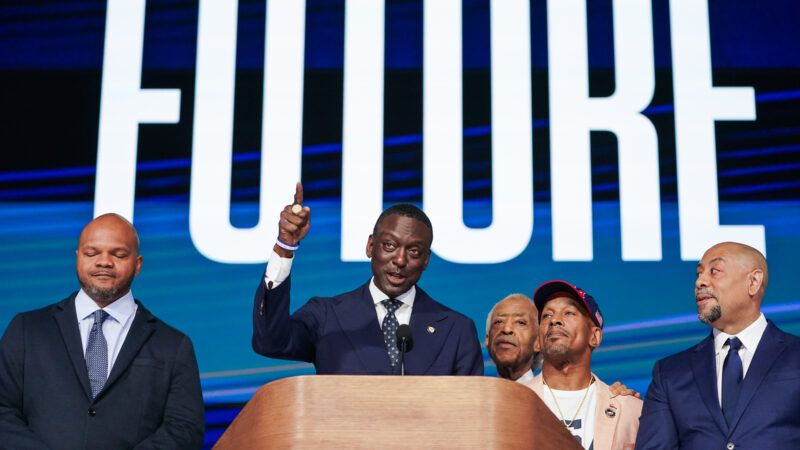Criminal Justice Reform Took a Back Seat at the 2024 DNC
The official Democratic Party platform no longer endorses abolishing the death penalty, decriminalizing marijuana, or repealing mandatory minimums.

Criminal justice reform and police accountability were once center-stage in Democratic politics, but four years after the massive protests of 2020, they've been replaced by more law enforcement—friendly rhetoric and quietly cut from the party platform.
At the 2024 Democratic National Convention, which wrapped up in Chicago last night, one of the only major acknowledgments of criminal justice issues was an appearance by four of the five members of the Central Park Five—a group of black and Hispanic teenagers who were convicted of raping a jogger in Central Park in 1989 but who were cleared in 2002 by DNA evidence and the confession of another man.
Following the crime, Donald Trump took out full-page advertisements in four New York City newspapers calling for the Central Park Five to be executed, and the former president has refused to apologize for it in the years since they were exonerated.
"He called us animals. He spent $85,000 on a full-page ad in The New York Times calling for our execution," one of the men, Korey Wise, said at the DNC. "We were innocent kids, but we served a total of 41 years in prison."
That was the exception, though. Tonally, the DNC was an embrace of law enforcement and Kamala Harris' prosecutor background, complete with a parody video of the intro to the Law and Order TV series. This is part of Democrats' "prosecutor vs. felon" messaging, which attempts to contrast Trump's criminal record with Harris' law-and-order bona fides. (For a more full accounting of Harris' record as a district attorney and California attorney general, read Elizabeth Nolan Brown's definitive 2019 piece for Reason, "Kamala Harris Is a Cop Who Wants To Be President.")
The DNC even brought out a real police officer, Genesee County Sheriff Chris Swanson of Michigan, to show that Democrats can back the blue and vice versa.
"As a prosecutor, Kamala Harris protected us by putting violent criminals and sex offenders behind bars," Swanson said. "If I was in the courtroom, she's exactly the tough prosecutor that I'd want to see."
Swanson's inclusion was indicative of how much, or how little, thought the DNC organizers gave to criminal justice issues. Swanson was one of two Michigan sheriffs named in a class-action lawsuit filed earlier this year accusing county officials of colluding with large prison telecom companies to end face-to-face jail visitations and then price-gouge families who are forced to rely on phone calls and video chat services, in return for major kickbacks.
Other speakers emphasized how Harris worked as a prosecutor to protect not only victims but also defendants unjustly swept up into the system.
The differences between 2020 and 2024 were hard to ignore. In her 2020 DNC speech accepting the nomination for vice president, Harris noted "the excessive use of force by police" and broader inequities in the criminal justice system. She name-dropped George Floyd and Breonna Taylor. Harris' speech last night didn't mention the police, except in passing references to the January 6 riot.
The 2024 Democratic Party platform has several conspicuous absences as well: It doesn't call for abolishing the federal death penalty like it did in 2016 and 2020, doesn't promise to decriminalize marijuana, and doesn't mention mandatory minimum sentences at all. While the 2020 platform called police brutality a "stain on the soul of our nation," the 2024 platform merely notes that "there are places in America today where the bonds of trust [between police and communities] are frayed or broken."
Republicans, meanwhile, completely abandoned criminal justice reform at their national convention in July. The Republican Party's 2012 and 2016 platforms praised red states for creating diversion and reentry programs, and the 2020 RNC featured a speech by Alice Johnson, a federal drug offender who Trump freed from a life sentence. But there was no place for that kind of thing amid the claims at this year's RNC that a plague of crime and lawlessness is sweeping the country.
The problem with Republicans' attempts to tie Democrats to rising crime, though, is that crime isn't rising anymore. The crime spike was four years ago, and now crime rates are falling fast—historically fast, if the preliminary data holds up. As Reason's Jacob Sullum recently wrote, Trump's claims that "homicides are skyrocketing in American cities under Kamala Harris" is simply not supported by the numbers.
In a race to beat each other, Democrats and Republicans are turning their backs on one of the few laudable things they worked together on over the past decade, for reasons that are either opportunistic or imaginary.


Show Comments (42)